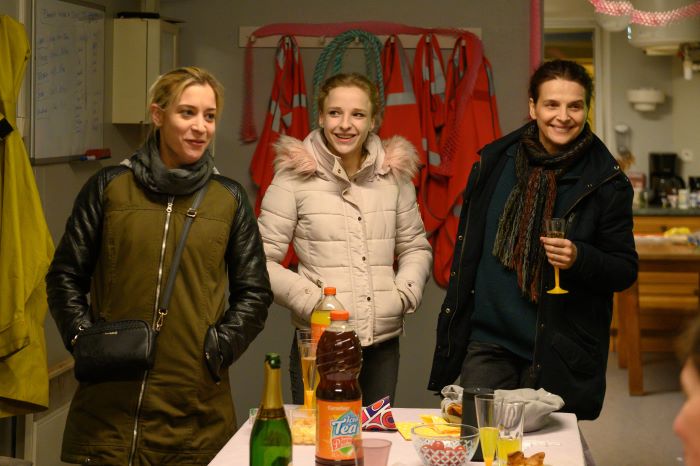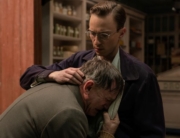
From left, Hélène Lambert, Léa Carne, and Juliette Binoche in Between Two Worlds (Cohen Media Group)
Based on journalist Florence Aubenas’s 2010 French bestseller The Night Cleaner, Emmanuel Carrère’s well-intentioned drama examines how the economically disadvantaged struggle to put food on the table and house themselves and their families while moving from temporary job to temporary job at criminally low wages with subpar working conditions.
In a typically intense and committed performance, Juliette Binoche plays Marianne Winckler, a journalist (based on Aubenas) who goes undercover as an unemployed divorcée to take on menial cleaning jobs and write an exposé about how, well, the other half lives. But right from the start, having Marianne at the center of the story throws it off-balance, since it’s hardly earth shattering or suspenseful to dramatize her attempts to keep her identity hidden from other workers (mostly women) at her various jobs, especially since—as a character notes—she can always go back to her other life after her research is done, which the others cannot do.
Indeed, scenes of Marianne (who has moved from Paris to a working-class area of Caen, a town in Normandy) sitting at her laptop and typing up her notes from that day’s adventures while we hear her accounts in voice-overs come off as routine. However, the heart of the film—which Carrère, to his credit, emphasizes—are Marianne’s relationships with the other cleaning women.
Marianne becomes especially close to two women she works with on the passenger ferry to Portsmouth, England, cleaning cabins: the lonely, young Marilou and Christèle, the hardscrabble single mother of three boys. The time Marianne spends with these two are the film’s most honest and poignant, displaying the humanity and individuality of these women to whom life has thrown a curveball but who continue to persevere despite difficulties. The film’s most affecting moment occurs when Christèle’s sons bring out a cake for Marianne and sing “Happy Birthday.” (The youngest boy tells Marianne that Christèle stole a glance at Marianne’s ID to find out her birthdate). It crystallizes Marianne’s empathy for co-workers who have become her genuine friends.
Too bad that such striking scenes are separated by those more prosaic glimpses of Marianne at her laptop or scrubbing toilets or making beds, which have the feel of a mundane documentary. At times, Carrère seems to want to make his own version of a Ken Loach film, but Loach’s righteous anger and even occasional stridency grab viewers and force them to take a side. Yet Between Two Worlds’ attempt at social realism often keeps viewers at a chilly remove.
Not helping matters are the contrivances rearing their heads toward the end, such as when Marianne, Marilou, and Christèle get stuck on the ferry and must spend the night traveling across the Channel and back. They commandeer a first-class cabin, drink champagne, and eat macarons while having intimate conversations that make Marianne realize how close they have become.
The film’s English title unoriginally describes the story line. Admittedly, the original French title, Ouistreham, means little to foreign audiences—Ouistreham, the port of Caen, is where the ferry to England originates. But something more evocative, like Between Two Ports, might better convey the transient lives of these economically unstable women and not simply describe Marianne as a journalist playing a role.
Along with the always excellent Binoche, Léa Carne makes a quite sympathetic Marilou, while Hélène Lambert’s Christèle is so strongly enacted as to become the main character. Carrère must sense this, for his indelible final image is of Marilou and Christèle, standing stoically on the bus taking them back to the ferry to work, which is—unlike for Marianne—their real life.






Leave A Comment